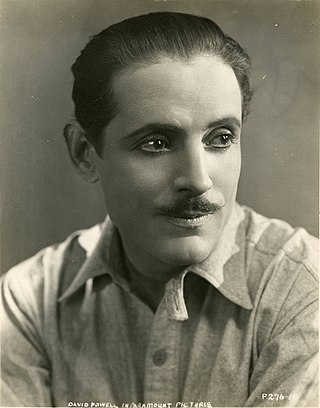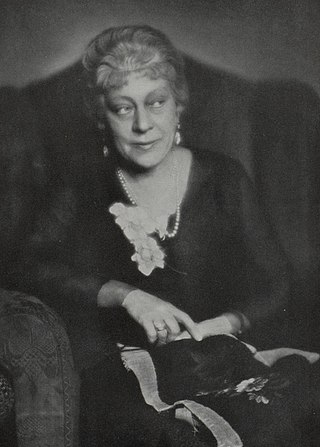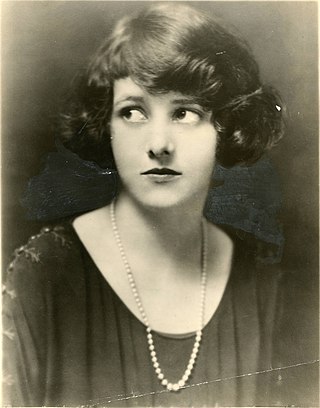Florence Billings | |
|---|---|
 | |
| Born | January 19, 1895 New York City, U.S. |
| Died | ? |
| Occupation | Actress |
| Years active | 1915 – 1925 (film) |
Florence Billings (born 1895) was an American film actress of the silent era. [1]
Florence Billings | |
|---|---|
 | |
| Born | January 19, 1895 New York City, U.S. |
| Died | ? |
| Occupation | Actress |
| Years active | 1915 – 1925 (film) |
Florence Billings (born 1895) was an American film actress of the silent era. [1]

Anna Quirentia Nilsson was a Swedish-American actress who achieved success in American silent movies.

Florence Vidor was an American silent film actress.

David Powell was a Scottish stage and later film actor of the silent era.

Walter Hiers was an American silent film actor.

Stuart Holmes was an American actor and sculptor whose career spanned seven decades. He appeared in almost 450 films between 1909 and 1964, sometimes credited as Stewart Holmes.

Kate Lester was an American theatrical and silent film actress. Her family, the Suydams of New York, were staying in Britain at the time of her birth.

Frank Currier was an American film and stage actor and director of the silent era.

J. Barney Sherry was an American actor of the silent film era. He appeared in more than 210 films between 1905 and 1929. He was born in Germantown, Pennsylvania and died in Philadelphia, Pennsylvania from cardiovascular disease.

Harvey Thornton Clark was an American actor on stage and screen. He appeared in more than 200 films between 1915 and 1938. He was born in Chelsea, Massachusetts, and died in Hollywood, California, from a heart attack.
Maurice Elvey was one of the most prolific film directors in British history. He directed nearly 200 films between 1913 and 1957. During the silent film era he directed as many as twenty films per year. He also produced more than fifty films – his own as well as films directed by others.

Mayme Kelso was an American actress of the silent era. She appeared in more than 70 films between 1911 and 1927. She was born in Columbus, Ohio, and died in South Pasadena, California from a heart attack. She is especially known for her performances in Seven Keys to Baldpate (1925), Male and Female (1919), and Clarence (1922).

Lydia Knott was an American actress of the silent film era. She appeared in more than 90 films between 1914 and 1937.

Olga Engl was an Austrian-German stage and motion picture actress who appeared in nearly 200 films.

Frida Richard was an Austrian actress. She was a prolific actress in both the silent and sound eras.

Rudolf Biebrach was a German actor and film director. He directed over 70 films between 1909 and 1930; and he appeared as an actor in nearly 110 films between 1909 and 1938. In his youth, Biebrach had worked for some years as an engraver. He got his first engagement as an actor in Gießen during 1890/1891. After a long career as a stage actor, Biebrach managed to become a successful director and character actor in the German film during the 1910s. He directed many films with Henny Porten and Lotte Neumann.

Margarete Kupfer was a German actress.
Hermann Picha was a German stage and film actor. Picha was extremely prolific, appearing in over 300 short and feature films during the silent and early sound eras. Picha played a mixture of lead and supporting roles during his career. He played the title role in the 1920 film Wibbel the Tailor, directed by Manfred Noa. He appeared in Fritz Lang's Destiny.

Selznick Pictures was an American film production company active between 1916 and 1923 during the silent era.
William Ewart Fildew, billed as either William Fildew or William E. Fildew, was an American cinematographer during the silent film era. He shot 54 films between 1915 and 1927. His first film was 1915's The Lost House, directed by Christy Cabanne and starring Lillian Gish. That same year he also shot Martyrs of the Alamo, directed by Cabanne, which was the first film in which Douglas Fairbanks appeared. Fairbanks' first starring role, also in 1915, was The Lamb, which Fildew also shot. His final film was The Wreck, directed by William James Craft and starring Shirley Mason and Malcolm McGregor.

Frederica "Faire" Binney, was an American stage and film actress.